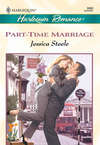Czytaj książkę: «Vacancy: Wife of Convenience»
A wedding dilemma:
What should a sexy, successful bachelor do if he’s too busy making millions to find a wife? Or if he finds the perfect woman, and just has to strike a bridal bargain….
The perfect proposal:
The solution? For better, for worse, these grooms in a hurry have decided to sign, seal and deliver the ultimate marriage contract…to buy a bride!

His Hired Bride by Susan Fox
#3848
Jessica Steele lives in a friendly Worcestershire village in England with her super husband, Peter. They are owned by a gorgeous Staffordshire bullterrier called Florence, who is boisterous and manic, but also adorable. It was Peter who first prompted Jessica to try writing and, after the first rejection, encouraged her to keep on trying. Luckily, with the exception of Uruguay, she has so far managed to research inside all the countries in which she has set her books, traveling to places as far apart as Siberia and Egypt. Her thanks go to Peter for his help and encouragement.
Jessica Steele’s classic love stories will whisk you into a world of pure romantic excitement. Get ready to be swept off your feet by perfect English gentlemen!
Books by Jessica Steele
HARLEQUIN ROMANCE®
#3720—A PROFESSIONAL MARRIAGE
#3741—AN ACCIDENTAL ENGAGEMENT
#3763—A PAPER MARRIAGE
#3787—HER BOSS’S MARRIAGE AGENDA
#3824—A PRETEND ENGAGEMENT
Vacancy: Wife of Convenience
Jessica Steele

CONTENTS
CHAPTER ONE
CHAPTER TWO
CHAPTER THREE
CHAPTER FOUR
CHAPTER FIVE
CHAPTER SIX
CHAPTER SEVEN
CHAPTER EIGHT
CHAPTER NINE
CHAPTER ONE
SHE had first seen him at her father’s funeral, and had not expected to see him again. But here he was standing in front of her, tall, as she remembered, dark-haired and somewhere in his middle thirties.
Colly had not had the chance then to learn who he was; her stepmother of two years, only five years older than her, had monopolised him as they stood at the crematorium after the service. ‘Do come back to the house for some refreshment’, Colly had clearly heard Nanette urge.
He had suavely declined, looked as if he might come over to Colly to offer his condolences, but she had been buttonholed by someone else and had turned away. He spoke to her now, though, apologising that Mr Blake—the man she was at the Livingstone building to see—was unfortunately incapacitated that day.
‘Silas Livingstone,’ he introduced himself. She had not known his name; he obviously knew hers. ‘If you could hang on here for ten minutes, I’ll be free to interview you in his stead.’
‘Would you rather I made another appointment?’ She would prefer not to do that. She was nervous enough about this interview as it was, and was unsure if she would ever have the nerve to come back.
‘Not at all,’ he replied pleasantly. ‘I’ll see you in a short while,’ he added, and was already on his way to the adjoining office.
‘Would you like me to wait elsewhere?’ Colly asked the smart, somewhere in her late thirties PA, who appeared to be handling at least three tasks at one and the same time.
‘Better not,’ Ellen Rothwell replied with a kind smile. ‘Mr Livingstone has a busy day. Now that he’s found a slot for you, he’ll want you to be where he expects you to be.’
Colly smiled in return but decided to say nothing more. She found it embarrassing enough as it was that apparently, so Ellen Rothwell had explained, Vernon Blake’s present secretary had phoned around all the other applicants to cancel today’s appointments. But, on phoning Colly’s home at the start of business that day, had been informed that she was out and that there was no way of contacting her.
She had known that her stepmother had a spiteful streak. To deliberately refuse to call her to the phone when she had been in all the time only endorsed that fact.
Colly held back a sigh and tried to direct her thoughts to the forthcoming interview. Vernon Blake was the European Director at Livingstone Developments, and was looking for a replacement multilingual senior secretary. The salary advertised was phenomenal and, since Nanette wanted her to move out, would, if Colly were lucky enough to get the job, enable her to rent somewhere to live and be independent.
That had been her thinking at the time of spotting the advert. Never again would she be dependent on anyone. She had read the advert again. ‘Multilingual senior secretary.’ What was so difficult about that? She could, after all, type. And, though a little rusty with her languages, she had at one time excelled in French and Italian, and had scraped through with a pass mark in Spanish and German. So what else did a multilingual secretary need?
Watching Ellen Rothwell expertly deal with telephone calls, take notes in rapid shorthand and then calmly and charmingly sort out what seemed to be some sort of a problem, Colly realised that there was a lot else to being a secretary. And what experience of being a secretary did she have? Absolutely none!
She almost got up then, made her excuses, and bolted. Then she remembered why she wanted this job that paid so much. Very soon she would be homeless. And she, who had never had paid work in her life, desperately needed some kind of well-paid employment.
It hurt that her father had left his will the way that he had. His twenty-eight-year-old widow had inherited everything; his daughter nothing. He had a perfect right to leave his money and property to whoever he cared to, of course. But she, his only child, his housekeeper since the last one had walked out seven years ago, was now about to lose the only home she had ever known. Not that it felt like home any more.
Colly had been little short of staggered when, just over two years ago now, her dour, often grumpy parent had gone all boyish over the new receptionist at his club.
The first Colly had got to suspect that he was seeing someone was when he’d suddenly started to take an interest in his appearance. She’d been glad for him. Her mother had died when Colly was eight—he had been unhappy for far too long.
Her pleasure for him had been tinged with dismay, though, when a short while later he had brought the blonde Nanette home—Nanette was about forty years his junior! ‘I’ve been so longing to meet you!’ the blonde twenty-six-year-old had trilled. ‘Joey has told me such a lot about you.’
Joey! Her staid father, Joseph, was Joey! For his sake, Colly smiled and made her welcome and tried not to see the way Nanette’s eyes swept round the room taking inventory of anything valuable.
Had Colly secretly hoped that her father would still be as happy when Nanette backed away from whatever sort of relationship they had, then she was again staggered when, far from the relationship ending, Nanette showed her the magnificent emerald ring Joseph Gillingham had bought her, and declared, ‘We’re getting married!’
For the moment speechless, Colly managed to find the words to congratulate them. But when, adjusting to the idea that Nanette was to be mistress of her home, Colly mentioned that she would find a place of her own, neither her father nor Nanette would hear of it.
‘I’d be absolutely hopeless at housekeeping,’ Nanette twittered. ‘Oh, you must stay on to be housekeeper,’ she cooed. ‘Mustn’t she, darling?’
‘Of course you must,’ Joseph Gillingham agreed, the most jovial Colly had ever seen him. ‘Naturally I’ll continue to pay you your allowance,’ he added, with a sly look to his intended, making it obvious to Colly that her allowance—not huge by any means and which, with increasing prices, went to supplement the housekeeping—had been discussed by them.
The whole of it left her feeling most uncomfortable. So much so that she did go so far as to make enquiries about renting accommodation somewhere. She was left reeling at the rent demanded for even the most poky of places.
So she stayed home. And her father and Nanette married. And over the next few months her father’s new ‘kitten’ showed—when her husband was not around—that she had some vicious claws when things were not going quite her way. But she otherwise remained sweet and adoring to her husband.
Living in the same house, Colly could not help but be aware that Nanette had a very sneaky way with her. And within a very short space of time Colly was beginning to suspect that her new stepmother was not being true to her Joey. That Nanette plainly preferred male company to female company was not a problem to Colly. What was a problem, however, was that too often she would answer the phone to have some male voice enquire, ‘Nanette?’ or even, ‘Hello, darling.’
‘It isn’t Nanette,’ she would answer.
Silence, then either, ‘I’ll call back,’ or, ‘Wrong number.’
Colly could not avoid knowing that Nanette was having an affair when some months later she answered the phone to hear an oversexed voice intimately begin, ‘Who was the wicked creature who left me with just her earrings beneath my pillow to remind me of heaven?’
Colly slammed down the phone. This was just too much. Nanette, who was presently out shopping, had, so she had said, been out consoling a grief-stricken girlfriend until late last night.
When a half-hour later Nanette returned from her shopping trip Colly was in no mind to keep that phone call to herself. ‘The earrings you wore last night are beneath his pillow!’ she informed her shortly.
‘Oh, good,’ Nanette replied, not in the slightest taken aback to have been found out.
‘Don’t you care?’ Colly felt angry enough to enquire.
Nanette placed her carriers down. ‘What about?’
‘My father…’
‘What about him?’
Colly opened her mouth; Nanette beat her to it.
‘You won’t tell him,’ she jibed confidently.
‘Why won’t I?’
‘Is he unhappy?’
He wasn’t. Never a very cheerful man, he seemed, since knowing and marrying this woman, to have had a personality transplant. ‘He’s in cloud-cukoo-land!’ Colly replied.
Nanette picked up her clothes carriers. ‘Tell him if you wish,’ she challenged, entirely uncaring. ‘I’ve already—tearfully—told him that I don’t think you like me. Guess which one of us he’s going to believe?’
Colly very much wanted to tell her father what was going on, but found that she could not. Not for herself and the probability that, as Nanette so confidently predicted, he would not believe her, but because he was, in essence, a much happier man.
So, awash with guilt for not telling him, but hoping that he would not blame her too much when, as he surely must, he discovered more of the true character of the woman he had married, Colly stayed quiet.
A year passed and her father still adored his wife. So clearly Nanette was playing a very clever game and he had no idea that his wife had a penchant for flitting from affair to affair.
That was until—about six months before his sudden totally unexpected and fatal heart attack—Colly first saw him looking at Nanette with a little less than an utter doting look in his eyes.
He appeared only marginally less happy than he had been, though, but did during his last months spend more time in his study than he had since his marriage.
Her father had been a design engineer of some note and, though in the main largely retired, she knew from the top executives and first-class engineers who occasionally called at the house to ‘pick his brains’ that he was highly thought of by others in his specialised field.
And then, completely without warning, he died. Colly, in tremendous shock, could not believe it. She questioned the doctor, and he gravely told her that her father had suffered massive heart failure and that nothing would have saved him.
She was still in shock the next day, when Nanette sought her out to show her the will she had found when sorting through Joseph Gillingham’s papers. It was dated a month after his marriage, and Colly soon realised that Nanette had been more looking for his will than sorting through, especially when, triumphantly, Nanette declared, ‘What a little pet! He’s left me everything!’ And, without any attempt to look sorry, ‘Oh, poor you,’ she added. ‘He’s left you nothing.’
That was another shock. Not that she had expected to be left anything in particular. Naturally Nanette, as his wife, if she were still his wife by then, would be his main heir. Colly realised she must have assumed her father would go on for ever; he was only sixty-eight, after all. And while he was not enormously wealthy, his income from some wise investing many years before was quite considerable.
It was two days after her father’s death that Colly received a fresh shock when Nanette barged into her bedroom to coldly inform her, ‘Naturally you’ll be finding somewhere else to live.’
Somehow, and Colly hardly knew how she managed it, she hid the fresh assault of shock that hit her to proudly retort, ‘Naturally—I wouldn’t dream of staying on here.’
‘Good!’ Nanette sniffed. ‘You can stay until after the funeral, then I want you out.’ And, having delivered that ultimatum, she turned about and went from whence she came.
Feeling stunned, Colly couldn’t think straight for quite some minutes. She had no idea what she would do, but heartily wished her uncle Henry were there to advise her.
Henry Warren was not a blood relative, but her father’s friend, the ‘uncle’ being a courtesy title. She had known him all her life. He was the same age as her father but, newly retired from his law firm, he had only last week embarked on an extended holiday. He did not even know that his friend Joseph had died.
Not that the two had seen very much of each other since Joseph’s remarriage. Her father’s trips to his club had become less and less frequent. And Henry Warren seldom came to the house any more. It was because of their friendship that her father had always dealt with a different firm of solicitors, believing, as he did, that business and friendship did not mix. But Colly’s first instinct was to want to turn to Uncle Henry.
But he was out of the country, and as her initial shock began to subside she realised that there was no one she could turn to for help and advice. She had to handle this on her own. She had no father, and no Uncle Henry—and Nanette wanted her out.
Hot on the heels of that realisation came the knowledge that she barely had any money—certainly not enough to pay rent for more than a week or two on any accommodation she might be lucky enough to find. That was if prices had stayed the same in the two years since she had last looked at the rented accommodation market.
She was still trying to get her head together on the day of her father’s funeral.
She clearly recalled seeing Silas Livingstone there—his name now known to her. How Nanette managed to look the grieving widow while at the same time trying to get her hooks into Silas Livingstone was a total and embarrassing mystery to Colly. He and another tall but older man had gone to his car and had left straight after paying their respects at the crematorium anyhow, so Nanette’s invitation to ‘come back to the house’ had not been taken up.
Having applied for a job with Livingstone Developments, Colly had done a little research into the company. And, on thinking about it, she saw that it was not surprising that the firm should be represented at her father’s funeral that day. Livingstones were not the only big engineering concern to be represented.
She came out of her reverie to watch Ellen Rothwell handle whatever came her way. Secretarial work, it was fast being borne in on Colly, was more than just being able to type!
She had known that, of course. But supposed she must still be suffering shock mixed in with stress, strain and grief for her father, as well as a helping of panic thrown in, that, on seeing the advertisement for a multilingual senior secretary, and believing she could fulfil the multilingual part without too much trouble, she had applied.
She watched Ellen Rothwell for another thirty seconds, and realised more and more that she must have been crazy to apply. Colly got to her feet, ready to leave, but just then the door to Silas Livingstone’s office opened and there he was, a couple of yards away—so close, in fact, that she could see that his eyes were an unusual shade of dark blue.
‘Come through,’ he invited, standing back to allow her to precede him into his large and thickly carpeted office. She was five feet nine—and had to look up to him. She had been about to leave, but found she was going into his office. He followed her into a large room that housed not only office furniture but had one part of the room—no doubt where he conducted more relaxed business—given over to a coffee-table and several padded easy chairs. He closed the door behind them and indicated she should take a seat to the side of his desk. ‘I was sorry about your father,’ he opened.
So he knew who she was? ‘Thank you,’ she murmured.
‘Columbine, isn’t it?’ he asked, she guessed, since he had her application form in front of him, more to get her to feel at ease before they started the interview.
‘I’m called Colly,’ she replied, and felt a fool when she did, because it caused her to want to explain. ‘I thought, since I was applying—formally applying—for the position with Mr Blake that I should use my full name—er—formal name.’ She was starting to feel hot, but did not seem able to shut up. Nerves, she suspected. ‘But Columbine Gillingham is a bit of a mouthful.’ She clamped her lips tight shut.
Silas Livingstone stared at her and seemed glad that she had at last run out of breath. But, when she was getting ready to quite dislike him, he gave her a pleasant look and agreed, ‘It is, isn’t it?’ going on, ‘I stopped by Vernon Blake’s office earlier. His present secretary said everything was running smoothly in his absence with the exception of an interviewee, Columbine Gillingham, who could not be contacted. Your father’s obituary mentioned he had a daughter Columbine—I didn’t think there would be two of you.’
It was her turn to stare at him. Was that why he had decided to interview her himself—because of her connection with her father? But there was no time to ask, and she supposed it was irrelevant anyway, because, obviously a man with little time to spare, Silas Livingstone was already in interview mode.
‘What secretarial experience have you?’ he enquired, glancing down at her application form as if trying to read where, in invisible ink, it was stated she had any office experience at all.
She felt hot again. ‘I’m a bit short of actual secretarial experience,’ she felt obliged to reply, wondering anew at her temerity in actually applying for the senior secretarial post. ‘But my languages are good. And—and I type quite fast.’
He leaned back in his chair, his expression telling her nothing. ‘How fast?’ he enquired politely.
‘How fast?’ she echoed.
‘Words per minute.’ He elucidated that which any secretary worthy of the name would know. And, clearly already having formed a picture of her secretarial expertise—or lack of it, ‘Any idea?’ he asked.
She had no idea. Could not even give him a hint. She sat up straighter. ‘Shall I leave?’ she offered proudly.
He shook his head slightly, but she was unsure whether it was at her non-statement of work experience there before him or whether he was telling her that he would decide when the interview was over.
‘Have you ever had a job?’ He looked straight into her wide green eyes and asked directly.
‘Er—no,’ she had to admit. But quickly added, ‘I kept house for my father. When I left school I took over the housekeeping duties until…’
‘Until he remarried?’ Again that direct look.
‘I…My father’s new wife preferred I should continue to look after everything.’ Heavens, how lame that sounded!
‘So you have never had an actual job outside of the home?’
Keeping house had kept her pretty busy. Though there was her interest in art. ‘I usually help out at an art gallery on a Tuesday,’ was the best she could come up with. She had visited that particular gallery often enough over the years to get to know the owner, Rupert Thomas, who at one time had asked her to ‘hold the fort’ for him when he’d had to dash out. From there it had grown and, today being Tuesday, she would normally be doing a bit of picture-dusting, a bit of invoicing, a bit of dealing with customers, not to mention making Rupert countless cups of coffee were he around.
‘Is this paid employment?’ Silas Livingstone wanted to know.
She was feeling uncomfortable again, and knew for sure that she should never have come. ‘No,’ she admitted.
‘Have you ever worked in paid employment?’
‘My father gave me an allowance,’ she mumbled. She was unused to talking about money; it embarrassed her.
‘But you’ve never earned—outside of the home?’ he documented. Then abruptly asked, ‘Tell me, Columbine, why did you apply for this job?’
He annoyed her. He clearly could not see why, with her lack of experience, she had bothered to put pen to paper. She couldn’t see either—now. But his formal use of Columbine niggled her too. So much so that she was able to overcome her embarrassment about money to tell him shortly, ‘I am not my father’s heir.’ She locked antlers with Silas Livingstone—and would not back down. But she did not miss the glint that came to his eyes.
‘Your father left you something, though? Left you provided for?’ he did not hesitate in asking.
Colly did not want to answer, but rather supposed she had invited the question. ‘He did not,’ she answered woodenly.
‘I thought he had money?’
‘You thought correctly.’
‘But he left you—nothing?’
‘Nothing.’
‘The house?’
‘I need to find somewhere else to live.’
There was a sharp, shrewd kind of look in those dark blue eyes as he looked at her. ‘Presumably the new Mrs Gillingham did quite nicely,’ he stated—and Colly knew then that, while her father had been blind to the taking ways of Nanette, Silas Livingstone, within the space of the few minutes he had been in conversation with her at the crematorium, had got her measure.
But Colly was embarrassed again, and prepared to get to her feet and get out of there. It went without saying that she had not got the job. He must think her an idiot to have ever applied for the post in the first place. All she could do now was to try to get out of there with some shred of dignity intact.
She raised her chin a proud fraction. ‘Thank you for seeing me, Mr Livingstone. I applied for the job because I need to work, and not from some whim…’
‘Your allowance is stopped?’ He said it as if he knew it for a fact. ‘You need to finance yourself?’
‘I need a job that pays exceptionally well if I’m to live in a place of my own and be self-sufficient. But…’
‘You’re looking for somewhere to rent?’
‘That’s one of my first essentials,’ she confirmed. ‘That and to be independent. I intend to make a career for myself. To—’
She broke off when Silas Livingstone all at once seemed to be studying her anew. There was certainly a sudden kind of arrested look in his eyes, an alertness there, as if some thought had just come to him.
But even while she was scorning such a notion she could not deny he seemed interested in what she was saying. ‘What about men-friends?’ he asked slowly. ‘You obviously have men-friends,’ he went on, flicking a brief glance over her face and slender but curvy figure. ‘Where do they come into your career-minded intention to be independent?’
She had thought the interview was over, and had no idea where it was going now. But since she had told this man so much, without ever having intended to—it spoke volumes for his interviewing technique—there seemed little point in holding back now. ‘My father saw fit to leave everything to his new wife, and that was his prerogative. But it was a shock to me just the same, and it has made me determined to never be dependent on anyone ever again.’ She went to get to her feet, but Silas Livingstone was there with another question.
‘You have one man-friend in particular?’ he enquired.
‘Right now I have no interest in men or even dating,’ she replied. ‘I…’
‘You’re not engaged?’
‘Marriage is the last thing on my mind.’
‘You’re not thinking of settling down, or living with some man?’
‘Marriage, men or living with one of them just doesn’t enter my plans,’ she answered. ‘I’m more career-minded than husband-minded. I want to be independent,’ she reiterated. She had never been interviewed for a job before, so supposed being asked such detailed and personal questions must be all part and parcel of a job interview, but to her mind the interview was over. ‘I apologise for taking up so much of your time,’ she began, prior to departing. ‘I thought when I applied for the job that I would be able to do it. It was never my intention to waste Mr Blake’s time—or yours. But, since I obviously haven’t got the job, I won’t waste any more of it.’
She got up from her chair—but, oddly, Silas Livingstone motioned that she should sit down again. She was so surprised by that—she’d have thought he could not wait for her to be gone—that she did in fact sit down.
‘I’m afraid you haven’t the level of experience necessary to work for Vernon Blake,’ Silas Livingstone stated. ‘But,’ he went on, before she could again start to wonder why, in that case, she had sat down again, ‘there is the possibility of something else that might be of interest.’
Colly’s deflated spirits took an upturn. While it was fairly certain that this other job would not pay as well as the one advertised, there was hope here that she might find a job that would lead to better things. Why, a company of Livingstone Developments’ size must employ hundreds of office staff. Why hadn’t she thought of that? She had a brain, there must be quite a few other jobs she could do!
‘I’d be interested in anything,’ she answered, trying not to sound too eager, but ruining it by adding, ‘Absolutely anything.’
He silently studied her for what seemed an age. Studied her long and hard, before finally replying, ‘Good.’
‘What sort of work is it? I’m fairly good with computers. Or perhaps it’s something to do with translating? I’d—’
‘It’s a—newly created post,’ he cut in. ‘The details haven’t been fully thought through yet.’ Again he seemed to study her, his eyes seeming to take in everything about her. ‘Perhaps you’d be free to join me for lunch—say, Thursday?’
‘Lunch?’ she repeated. Was this the way of interviews?
He did not answer, but opened a drawer and withdrew what appeared to be a desk diary and began scanning it. But even while she was getting her head around the notion of lunching with this man while he told her more fully the details of this new vacancy he was shaking his head.
‘By the look of it lunch is out for the next couple of weeks.’ That was a relief. Personable though the man was, not to say downright good-looking, she somehow felt oddly reluctant to have lunch with him. Her relief, however, was short-lived, because, rehousing his diary, Silas Livingstone looked across at her. ‘It will have to be dinner,’ he announced. And, as cool as you please, ‘Are you free this Friday?’ he enquired.
Colly wasn’t sure her jaw did not drop. She closed her mouth and stared at him. While admittedly she did not have all that much experience of men—this was a new approach. She might also not have any experience with general job interview procedure either, but she did not feel she had to be a genius to work out that this was far from the norm.
‘Forgive me, Mr Livingstone,’ she replied, striving hard for some of his cool tone. ‘But I believe I’ve already told you that my interest rests solely with finding a job that pays well.’ And, in case he had forgotten, she repeated, ‘Men and dating just do not figure in my plans for the foreseeable future.’
‘I heard you,’ he replied evenly, adding—totally obscurely as far as she was concerned—‘That is an excellent start. But,’ he went on, ‘my sole intention in requiring you to have dinner with me is so we may discuss, in informal detail, this newly arisen—vacancy.’
Colly eyed him warily. Two years ago she hadn’t had a suspicious bone in her body. But two years of living under the same roof as the devious Nanette had taught her not to take everything at face value.
‘This is business?’ Colly stayed to probe.
‘Strictly business,’ he answered, with not a smile about him.
Colly studied him. It made a change. But, looking at him, she somehow felt she could believe him. Could believe that this was not some newfangled way of him getting a date. And, looking at him, sophisticated and virile, she suddenly saw it was laughable that this man, who probably had women falling over him, would need to use any kind of a ruse to get a woman to go out with him anyway. Indeed, Colly started to feel a trifle pink about the ears that she had for one moment hinted that he might be interested in her in more than a ‘business’ way.
‘Friday, you said?’ she questioned finally, when he had given her all the time she needed to sift through everything.
‘If you’re free,’ he agreed.
‘This job—’ she gathered her embarrassed wits together ‘—you can’t tell me more about it now?’
‘The—situation is recent, as I mentioned. I need to do some research into all it entails.’
‘You’ll have done your research by Friday?’
‘Oh, yes,’ he replied evenly.
She wanted to ask if the job was working for him. But, since he was the head of the whole shoot, she thought it must be. ‘Bearing in mind my lack of experience, you think I would be able to do the job?’
Darmowy fragment się skończył.




















